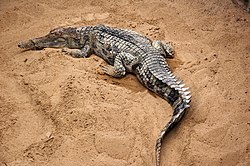False gharial
The false gharial or Malayan gharial (Tomistoma schlegelii) is a fresh-water reptile. It looks like a crocodile with a very thin and long snout, like that of the gharial. That is where the name of the species is from.
| Tomistoma Temporal range:
| |
|---|---|

| |
| Scientific classification | |
| Kingdom: | |
| Phylum: | |
| Class: | |
| Order: | |
| Family: | |
| Genus: | Tomistoma Müller, 1846
|
| Binomial name | |
| Tomistoma schlegelii (Müller, 1838)
| |

| |
| Range of false gharial | |
It has long been classed in the family Crocodylidae. However, recent immunological studies show it is more closely related to the gharial than was originally thought. So now classed in the family Gavialidae, after all.[1]
The animal is native to six river systems in Sumatra and Malaysia. It can also be found in Borneo, Java, Vietnam, Thailand (not seen since 1970), and possibly Sulawesi. Fossils finds in southern China indicate that, at some point in the past, the species occurred there.
The false gharial, like all other crocodilians, lays eggs. It is a mound nester. Females usually mature at 2–3 m. Mated females will lay a clutch of 30-60 eggs in a mound of dry leaves or peat. Once the eggs are laid, and construction of the mound is completed, she abandons her nest. Unlike most other crocodilian species, the young receive no parental care and are at risk of being eaten by predators like wild boar, mongooses, big cats such as tigers and leopards, civets, and wild dogs. The young hatch after 90 days and are left to look after themselves.

The false gharial is threatened with extinction throughout most of its range. The drainage of its freshwater swamplands and clearance of surrounding rainforests removes its habitat. The animal is hunted frequently for its skin and meat and the eggs are often taken for human consumption. However, positive steps have been taken by the Malaysian and Indonesian governments to prevent its extinction in the wild.
References
changeSources
change- Crocodile Specialist Group (2000). Tomistoma schlegelii. 2006 IUCN Red List of Threatened Species. IUCN 2006. Retrieved on 09 May 2006. Database entry includes a brief justification of why this species is endangered and the criteria used
